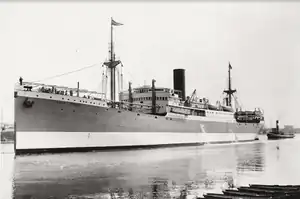MV Kota Pinang (Reconnaissance ship)
MV Kota Pinang was a cargo liner ordered by Rotterdamsche Lloyd and built by Nederlandsche Scheepsbouw Maatschappij in Amsterdam in 1930. She was launched on 23 November 1930.[2] In May 1940, the ship was requisitioned by the Kriegsmarine, renamed to the MV Clara and converted into a Reconnaissance scout [3] for naval operations by the German battleship Bismarck and cruiser Prinz Eugen in the Atlantic.[4] In June 1941, the ship was converted again to operate as a U-boat supply vessel.[4] On the 3 October 1941, she was sunk by the British cruiser Kenya.
 The Kota Pinang in the North Sea Canal, just after being launched. | |
| History | |
|---|---|
| Name |
|
| Owner | Rotterdamsche Lloyd |
| Builder | Nederlandsche Scheepsbouw Maatschappij |
| Yard number | 201 |
| Laid down | 16 January 1929[1] |
| Launched | 23 November 1929 |
| Completed | 29 May 1930 |
| Homeport | Amsterdam |
| Identification |
|
| Fate | Scuttled |
| General characteristics | |
| Type | Cargo liner |
| Tonnage | 7,275 GRT |
| Length | 464 ft 7 in (141.61 m) |
| Beam | 60 ft 8 in (18.49 m) |
| Height | 29 ft 10 in (9.09 m) |
| Installed power | 5200 Bhp |
| Propulsion | 1 x MAN 7-cylinder 2-stroke double-acting diesel engine |
| Speed | 14 knots (26 km/h; 16 mph) |
Construction
The Kota Pinang was one of a number of cargo liners built from the mid-1920s onwards by Rotterdam Lloyds to take Muslim pilgrims from the Dutch East Indies to Jeddah, on their journey to the Hajj.[5] The first ship in the series was the Kota Inten built in 1928.[5]
Sinking
On 3 October 1941, the Kota Pinang was sighted at 43.51°N 24.06°W, 750 miles (1,210 km) west of Cape Finisterre by the Fiji-class cruiser Kenya.[6] At 17:18 hours, the Kota Pinang reported a ship behind her.[7] At the time, the Kota Pinang was being escorted by the German submarine U-129. Kota Pinang attempted to disguise herself by signalling that she was an English freighter, in an attempt to lure Kenya across the line of fire, of her escort[7] Heavy rain stymied her efforts and at 17:28 hours Kenya opened fire on the Kota Pinang, which was heavily damaged.[7] At 17:43 the captain ordered the crew to abandon ship and at 17:45, scuttling charges exploded in the Kota Pinang engine room.[7] The Kenya fired a single torpedo to complete the ships sinking.[7]
The German submarine U-79 had been ordered to escort the Kota Pinang to the South Atlantic and waited at their rendezvous point, not realising she had already been sunk.[8]
References
- "KOTA PINANG - ID 3529". Stichting Maritiem-Historische Databank (in Dutch). Maritiem-Historische Databank Foundation. Retrieved 18 August 2021.
- Tony, Alan. "Kota Pinang MV (1930~1940) Klara MV (+1941)". Wrecksite. The Wrecksite. Retrieved 17 August 2021.
- Greenway, Ambrose (2012). Cargo Liners: An Illustrated History. Barnsley: Seaforth Publishing. p. 46. ISBN 9781783464630.
- Paterson, Lawrence (6 May 2002). Second U-Boat Flotilla. Casemate Publishers. p. 196. ISBN 978-1-78337-967-5.
- Greenway, Ambrose (2012). Cargo Liners : an Illustrated History. Havertown: Seaforth Publishing. p. 71. ISBN 9781783464630. OCLC 1048583592.
- Cooper, James; Haws, Duncan (1998). Rotterdam Lloyd. Uckfield. p. 99. ISBN 9780946378357.
{{cite book}}: CS1 maint: location missing publisher (link) - Paterson, Lawrence (2003). Second U-boat Flotilla. Barnsley, S. Yorkshire: L. Cooper. p. 197. ISBN 9780850529173.
- Paterson, Lawrence (2021). First U-Boat Flotilla. Pen & Sword Military. ISBN 9781399013420.